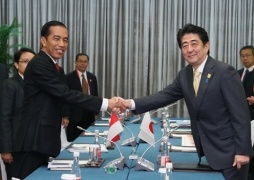Japan-Indonesia Relations
Japan-Indonesia Summit Meeting
 (Photo: Cabinet Public Relations Office)
(Photo: Cabinet Public Relations Office)
1. Bilateral relations
(1) Confirmation of the further enhancement of bilateral relations
Prime Minister Abe congratulated President Joko on his inauguration and stated that Japan highly valued relations with Indonesia as a strategic partner of Japan. Furthermore, Prime Minister Abe expressed his intention to closely cooperate with President Joko to ensure that Japan, as a maritime nation like Indonesia, can contribute to the peace and prosperity of the region. In response, President Joko expressed his intention to further develop Indonesia’s close relations with Japan, and the two leaders shared the view that Japan and Indonesia should further enhance their bilateral relations under the new Indonesian government.
(2) Maritime cooperation
Stressing the importance of keeping Asia’s sea open, free and peaceful, Prime Minister Abe expressed his intention to support President Joko’s proactive approach toward maritime issues and also stated that Japan was making contributions to this end through “the three principles of rule of law at sea”. In response, President Joko explained his vision for Indonesia as a maritime nation and expressed his recognition that rule of law at sea was important.
Moreover, President Joko expressed his assent for Prime Minister Abe’s suggestion that Japan and Indonesia should establish working-level consultations to formulate maritime cooperation initiatives between the two countries, including the preparation of ports and harbors, improvement of maritime security capacity, and promotion of the fishery industry, and the two leaders shared the view that Japan and Indonesia should start working-level consultations for formulating cooperative initiatives in the maritime field.
(3) Politics and security
With regard to Japan’s security policies, Prime Minister Abe explained Japan’s security policies stating that Japan has been promoting initiatives of “proactive contribution to peace” based on the principle of international cooperation. President Joko explained that Indonesia was also contributing to global peace through its participation in peace-keeping operations.
(4) Economy and economic cooperation
Prime Minister Abe stated that he would support Japanese enterprises’ advancement into Indonesia to further deepen win-win economic relations. Furthermore, Prime Minister Abe stated that the establishment of the appropriate investment environment in Indonesia, such as the development of the necessary infrastructure, would be crucial for increasing investment, and that Japan would cooperate with Indonesia through high-quality infrastructure development such as ports and harbors, urban transportation, and power plants, including in the Metropolitan Priority Areas for Investment and Industry (MPA) in the JABODETABEK Area. In response, President Joko expressed his high hopes that Japan would increase its investment and cooperation in infrastructure development.
The two leaders also exchanged views on economic concerns. Prime Minister Abe conveyed his intention to resolve any economic concerns, including those posed by the new mining law, based on the overall perspective of mutually beneficial relations.
2. Regional affairs and other issues
(1) Concerning the issues surrounding the South China Sea, Prime Minister Abe stressed the importance of finding a peaceful solution to the issue, based on the “rule of law,” as well as the need for ASEAN to respond as one, including discussion on the code of conduct (COC) in the South China Sea. Moreover, Prime Minister Abe stated that he was aware that President Joko had expressed his intention to serve as a broker on this issue and said that he would support the efforts by Indonesia. President Joko stated that Indonesia would fulfill the role of an “honest broker” with regard to the issues surrounding the South China Sea.
(2) Prime Minister Abe stated the importance of United Nations (UN) Security Council reform, in view of the 70th anniversary of the UN establishment. In response, President Joko stated that he shared the recognition that the UN reform was important.
(3) Prime Minister Abe requested that President Joko visit Japan at an early date, to which President Joko expressed his gratitude and also his intention to do so.

